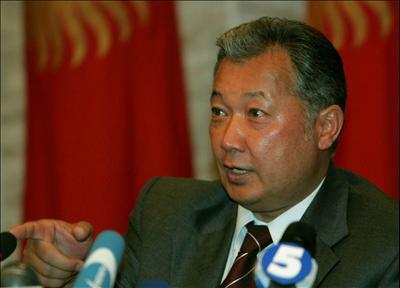Former President of Kyrgyzstan asked to turn himself over

The newly established interim government of Kyrgyzstan called for the former President Kurmanbek Bakiyev to turn himself over and face trial for the deaths of at least 82 people during the uprising in Bishkek last Wednesday. By Philip Pilkington.
The government said that if the former President refused to do so they would launch a special operation in order to capture him. The new administration said that Bakiyev may face detention but if he were to turn himself over they may be able to broker a deal that will allow him to leave the country.
Bakiyev has said that he is ready to quit as long as the new government will guarantee his and his family’s safety, the BBC reported today.
Opposition forces in Kyrgyzstan have long been stirring in protest, especially since the Tulip Revolution in 2005 which brought Bakiyev to power.
The Tulip Revolution, which took place in 2005, is widely recognised as a popular overthrow of a corrupt and inefficient regime. While some parallels may be drawn between the Tulip Revolution and the present uprising there are also many differences.
While the Tulip Revolution was relatively non-violent, the recent uprising was remarkably bloody. RosBusinessConsulting reports that at least 79 people were killed in the riots.
Speaking yesterday to Kazakhstan Today the press secretary for the Kyrgyzstan Ministry for Health Elena Bayalinova said “Three people died during the night in hospitals. In total, 500 people have been hospitalized. The number of injured people and the people who were taken to the medical institutions has been more than one and a half thousand people. There are seven unidentified bodies in morgue.” (Reuters)
Perhaps the most interesting aspect of the recent uprisings is allegations that international interference was central to the unfolding of recent events. One major catalyst for the uprising was the steep rise in utility prices. These price rises came after Russia imposed economic sanctions against Kyrgyzstan in response to their refusal to evict US forces from Manas air base.
Former President Bakiyev’s administration had previously agreed to evict the US forces in exchange for close to $2bn in loans from Russia.
Some have even suggested that the Russians were directly involved in the uprising. The independent global intelligence network STRATFOR reports that in the weeks before the revolution, select opposition leaders visited Moscow to meet with Russian Prime Minister Vladimir Putin.
STRATFOR also cites their sources as reporting the ‘pervasive’ presence of Russia’s Federal Security Service on the ground throughout the uprising.
Finally, STRATFOR claims that the day after the revolution Russia had readied 150 elite paratroopers to fly into Russian bases in Kyrgyzstan.
As the situation stabilised Russia quickly endorsed the new interim government.
